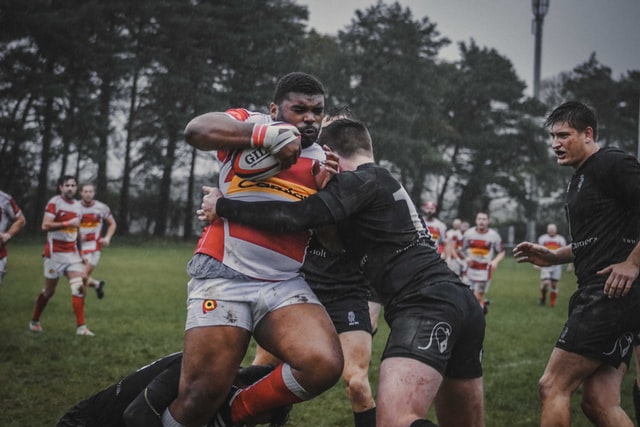With the recent advancement in technology and research, the science behind athletic sports performance has progressed significantly. In this article, Human Strength Hub takes a closer look at the five key factors that affect sports performance. So, let’s dig in, what are the 5 factors influencing sports performance?
In our opinion, the five main factors that affect sports performance include:
- Body Proportions
- Physical Fitness
- Technical Skill
- Psychological
- Nutrition
Please bear in mind that there are several more factors that influence sports performance, however, we think that these have the most impact.
Keep reading to learn more about each factor and the benefits they provide for overall sports performance.
5 Factors That Affect Sports Performance
This comprehensive article examines the key factors affecting sports performance. In the world of sport, athletes are constantly striving to improve their performance and achieve their personal best. A variety of factors can influence an individual’s ability to perform at their peak, both positively and negatively. Let’s take a closer look.
1. Body Proportions
Whilst the composition of the human body is genetically determined, it is possible to adjust body proportions through tailored exercise programs and proper nutrition. Body proportions refer to the distribution of muscle mass, bone structure, and body fat in an athlete. Optimal body proportions are essential for athletic success, as they can impact speed, agility, and overall performance.
2. Physical Fitness
Physical fitness is a major factor influencing sports performance. Defined as a successful adaptation to the stressors of one’s lifestyle, physical fitness is about developing fine motor abilities such as:
- Endurance
- Flexibility
- Speed
- Strength
- Power
- Agility
Generally, the most important aims of sports training are to improve and maintain physical fitness however, it is important to remember that each sport requires a different type and level of physical fitness.
So, let’s take a look at each motor ability in more detail..
Endurance
Endurance refers to an athlete’s ability to sustain physical activity for an extended period of time without experiencing fatigue. It is crucial for athletes participating in prolonged sports events, such as marathons or football matches. Improving endurance involves regular cardiovascular training, including running, swimming or cycling. Enhanced endurance also helps athletes maintain a consistent performance level and reduces the risk of injury.
Flexibility
Flexibility denotes the range of motion available at a joint or group of joints, allowing athletes to move freely and efficiently. It is crucial for sports that require fluid and extensive movements, such as gymnastics, dance or martial arts. Enhancing flexibility can be achieved through stretching exercises and yoga. Some of the benefits of improved flexibility include:
- Better performance
- Reduced risk of injury
- Increased muscle coordination
Speed
Generally, speed refers to the ability to move the body or a body part rapidly from one point to another. It is crucial in sports such as swimming or team sports. Some ways to improve speed involve engaging in sprint training, plyometrics and resistance training. Enhanced speed contributes to better sports performance, increased competitiveness and improved reaction time.
Strength
When we talk about strength in sports performance, we are referring to an individual’s ability to overcome resistance or to act against resistance. Strength is the most important motor ability in the field of sports as it is a direct product of muscle contraction. In fact, all movement in sports is caused by muscle contraction.
Strength ability can be divided into three types :-
- Maximum strength
- Explosive strength
- Strength endurance
To learn more about strength, take a look at our article, ‘How Does Strength Training Help in Sports?’.
Agility
Agility alludes to an athlete’s ability to change direction quickly and efficiently whilst maintaining balance, speed and coordination. It is crucial in sports like basketball, netball and tennis, where rapid changes in direction are common. You can enhance agility by completing agility drills, plyometrics and sport-specific training. Improved agility leads to better performance, quicker reaction times and increased competitiveness.
3. Technical Skill
An individual’s performance is improved by the acquisition of sports technical skills. This is an important aim of sports training. However, we must remember that the role of technical skills in different sports varies. The best way to improve technical ability is to practise continuously under the supervision of an experienced coach. For example, all of the best athletes do repetitive exercises on a day-to-day basis to improve their sports performance.
4. Psychological
Sports performance is the product of the total personality of the sportsperson. In fact, the level of skill depends heavily on the athlete’s qualities of head and heart. Essentially, it is all about how hard an individual is willing to push themselves.
These qualities can be split into four groups, including:
Disciplined Performance
Discipline is all about an athlete’s ability to consistently adhere to training regimens, strategies and routines to optimise sports performance. It entails dedication, commitment and self-control. Cultivating disciplined performance involves setting goals, creating structured training plans, and developing strong habits. The main benefits of remaining disciplined include consistent improvement, better time management and increased competitiveness.
Mental Control
Mental control refers to an athlete’s ability to maintain focus, composure and emotional stability during high-pressure situations. It plays a crucial role in sports performance, as it can influence decision-making, resilience, and overall performance.
Developing mental control can be accomplished through techniques such as meditation, visualisation, and sports psychology coaching. Enhanced mental control contributes to increased confidence, better decision-making, and improved performance under pressure.
Motivation and Goal Setting
Motivation is a key driver of sports performance, as athletes need a reason to push themselves to train and compete. Setting specific, measurable, achievable, relevant, and time-bound (SMART) goals can help them maintain motivation and focus on what they want to accomplish.
Focus and Concentration
The ability to maintain focus and concentration during training and competition is crucial for optimal sports performance. Athletes must be able to tune out distractions, allowing them to make the best decisions and execute their skills effectively.
5. Nutrition
Nutrition is the process of providing the body with the necessary nutrients to support optimal health, growth, and performance. Proper nutrition is vital for athletes to maintain energy levels, repair and build muscle tissue, and enhance recovery. In order to improve nutrition, athletes must have a balanced food regime, stay hydrated and adjust nutrient intake based on individual needs. Optimal nutrition contributes to better performance, faster recovery, and improved overall health.
So, how does nutrition directly affect sports performance?
Nutrition significantly affects athletic performance by providing the energy, nutrients and hydration required to sustain intense physical activity. A well-balanced food regime, tailored to an athlete’s specific needs, can optimise energy levels, muscle growth and recovery, all of which lead to enhanced performance. Neglecting nutrition can result in poor performance, increased risk of injury and compromised health.
What Other Factors Affect Sports Performance?
On top of the factors outlined above, here are some components that are often neglected when thinking about sports performance:
Environmental factors – The climate and weather conditions in which athletes train and compete can have a significant impact on their performance. Factors such as temperature, humidity, and wind can all influence an athlete’s ability to perform at their best.
In fact, according to FIFPRO (2023), extreme weather conditions can damage an athlete’s health and performance. In extreme heat, players are at risk of suffering from heat-stress disorders such as heat cramps, heat exhaustion, or heat strokes.
Training factors – Sports performance is also influenced by the quality of an athlete’s training facilities and equipment. Access to well-maintained facilities and high-quality equipment can help them train more effectively and efficiently, reducing the risk of injury and enabling them to maximise their potential.
Coaching factors – As we have mentioned already, coaches play a critical role in an athlete’s sports performance. This is because they can provide the guidance, support, and expertise necessary for an athlete to reach their full potential.
To find out more, take a look at our article, ‘What Does a Strength and Conditioning Coach Do?’.
Injury prevention and recovery strategies – This factor is often forgotten when it comes to sports performance. As we know, injuries can significantly derail an athlete’s progress and performance, making injury prevention and recovery strategies essential components of sports performance. Different strategies can help athletes reduce the risk of injury and enhance overall sports performance.
To read more about injury recovery strategies, take a look at our article, ‘When Should I Start Strengthening After Injury?’.
Sports Performance Coaching at Human Strength Hub
So, what are you waiting for? At Human Strength Hub, we offer high performance sports coaching for individuals looking to improve their performance in sport, such as athletes and high performing sportspeople.
As part of our sports coaching and performance program, you will work directly on your training, supplementation and nutrition with our sports performance coach, Roan Heming.
Start your journey today – contact us to find out more about our high performance sports coaching.
Sports Performance FAQs
What Is Sports Performance?
Sports performance refers to an athlete’s ability to demonstrate proficiency and skill in a particular sport, considering several physical, mental and environmental factors. It incorporates an athlete’s overall physical fitness, technical abilities, mental resilience and tactical understanding of the game.
The importance of sports performance lies in its direct correlation with an athlete’s success, competitiveness, and career longevity.
What Are The Benefits of Sports Performance Training?
There are many benefits to sports performance training, including:
- Increased stamina
- Enhanced muscular strength
- Improved flexibility
- Better body proportions
- Quicker speed
- Heightened agility
- Refined mental control
- Aids in injury prevention
- Fosters disciplined performance
- Optimises nutrition for peak performance
- Gain knowledge and confidence
- Facilitates good circulation
- Mental health benefits
Which Food Regime Is Best For Sports Athletes?
Whilst there is no one-size-fits-all food regime for sports athletes, we do recommend that individuals adopt a well balanced food regime for optimal performance and recovery. This includes a combination of –
- Carbohydrates
- Proteins
- Fats
- Vitamins
- Minerals
To find out more about how we can help with your health and fitness journey, take a look at the Human Health Hub.





